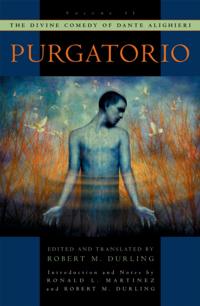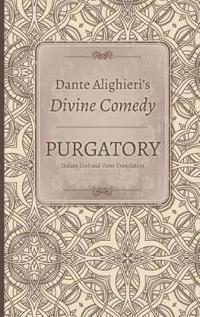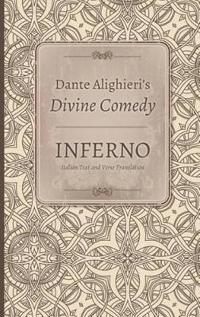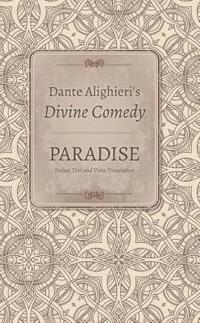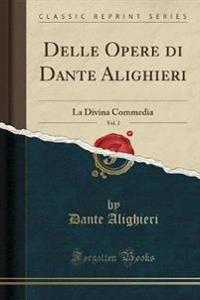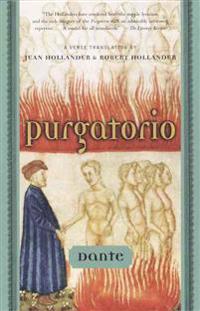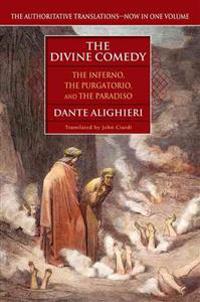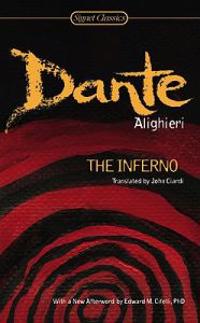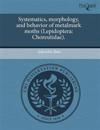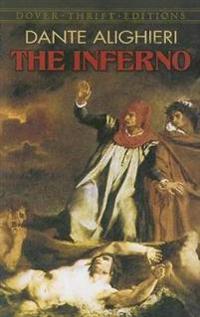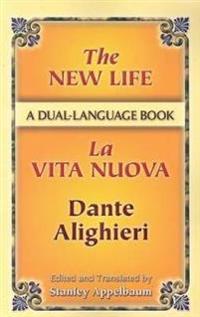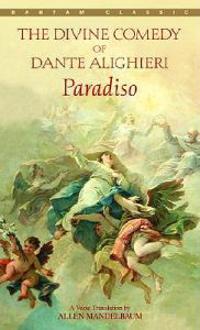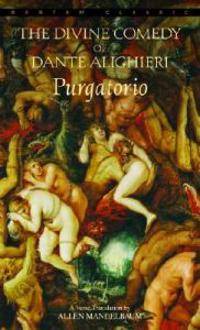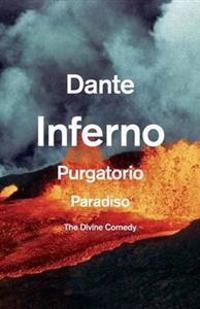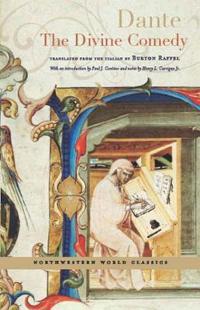Divine Comedy of Dante Alighieri: Volume 2: Purgatorio
ISBN: 9780199879830 - UTGIVEN: 2015-08In the early 1300s, Dante Alighieri set out to write the three volumes which make the up The Divine Comedy. Purgatorio is the second volume in this set and opens with Dante the poet picturing Dante the pilgrim coming out of the pit of hell. Similar to the Inferno (34 cantos), this volume is divided [...]
Delle Opere Di Dante Alighieri, Vol. 2: La Divina Commedia (Classic Reprint)
ISBN: 9780259828617 - UTGIVEN: 2018-11Inferno (Pocket)
avDante Alighieri, Gustave Dore
ISBN: 9780345483577 - UTGIVEN: 2005-10An introduction and notes, along with illustrations by Gustave Doré, accompany a new translation of the classic epic poem, now in a bilingual edition complete with extensive notes and appendixes, about a spiritual pilgrim being led by Virgil through the nine circles of hell. Reprint.[...]
Purgatorio (Häftad)
avDante Alighieri
ISBN: 9780385497008 - UTGIVEN: 2004-01A new verse translation of the second section of Dante's monumental epic, the Divine Comedy, chronicles the poet-narrator's odyssey, with the poet Virgil as his guide, up the Mount of Purgatory toward Paradise, in a new version that includes a detailed introduction, extensive notes, and commentaries[...]
Inferno (Pocket)
avDante Alighieri, Michael (TRN) Palma, Giuseppe (EDT) Mazzotta
ISBN: 9780393977967 - UTGIVEN: 2007-10This edition of Dante's masterpiece is based on Michael Palma's acclaimed verse translation. Lavinia Greenlaw wrote in the "New Statesman" that Palma "rejects archaism and rhetorical extravagance, preferring accuracy and rhythmic regularity" and Guido Waldman in "The Spectator" said "this Norton edi[...]
The Divine Comedy: The Inferno, the Purgatorio, the Paradiso (Häftad)
avDante Alighieri
ISBN: 9780451208637 - UTGIVEN: 200305
Dante Alighieri's poetic masterpiece, The Divine Comedy, is a moving human drama, an unforgettable visionary journey through the infinite torment of Hell, up the arduous slopes of Purgatory, and on to the glorious realm of Paradise--the sphere of universal harmony and eternal salvation.10 illust[...]The Inferno (Pocket)
avDante Alighieri, Edward M. Cifelli
ISBN: 9780451531391 - UTGIVEN: 200910
Belonging in the company of the works of Homer and Virgil, "The Inferno" is a moving human drama, a journey through the torment of Hell, an expression of the Middle Ages, and a protest against the ways in which men have thwarted the divine plan.
[...]The Paradiso (Pocket)
avDante Alighieri, Edward M. Cifelli
ISBN: 9780451531414 - UTGIVEN: 2009-10In "The Paradiso," Dante explores the goal of human striving: the merging of individual destiny with universal order. One of the towering creations of world literature, this epic discovery of truth is a work of mystical intensity? an immortal hymn to God, Nature, Eternity, and Love.
[...]The Purgatorio (Pocket)
avDante Alighieri, Edward M. Cifelli
ISBN: 9780451531421 - UTGIVEN: 2009-10In "The Purgatorio," Dante describes his journey to the renunciation of sin, accepting his suffering in preparation for his coming into the presence of God. This brilliant translation of Dante's canticle crystallizes the great poet's immortal conception of the aspiring soul.
[...]The Inferno (Pocket)
avHenry Wadsworth Longfellow, Dante Alighieri, Henry Wadsworth (TRN) Longfellow
ISBN: 9780486442884 - UTGIVEN: 2005-08The first of the three canticles in "La divina commedia (The Divine Comedy), this fourteenth-century allegorical poem begins Dante''s imaginary journey from Hell to Purgatory to Paradise with his sojourn among the damned. His encounters with historical and mythological creatures--each symbolic of a [...]
Dante Alighieri (Pocket)
avPaget Toynbee, Robert (INT) Hollander, Paget Toynbee
ISBN: 9780486443409 - UTGIVEN: 2005-08One of the most frequently cited texts on the great Florentine poet's life and writings, this invaluable study is the work of an influential Dante scholar. Paget Toynbee's meticulous attention to detail and clear analysis offer a concise account of Dante's world, opening with historical background o[...]
Paradiso: the Divine Comedy (Häftad)
avDante Alighieri
ISBN: 9780553212044 - UTGIVEN: 1920-01This brilliant new verse translation by Allen Mandelbaum captures the consummate beauty of the third and last part of Dante's Divine Comedy. The Paradiso is a luminous poem of love and light, of optics, angelology, polemics, prayer, prophecy, and transcendent experience. As Dante ascends to the Cele[...]
Purgatorio: the Divine Comedy of Dante Alighieri (Häftad)
ISBN: 9780553213447 - UTGIVEN: 1988-07This splendid verse translation by Allen Mandelbaum provides an entirely fresh experience of Dante's great poem of penance and hope. As Dante ascends the Mount of Purgatory toward the Earthly Paradise and his beloved Beatrice, through "that second kingdom in which the human soul is cleansed of[...]
The Divine Comedy (Häftad)
avDante Alighieri
ISBN: 9780691019123 - UTGIVEN: 1991-08Continuing the paperback edition of Charles S. Singleton's translation of "The Divine Comedy", this work provides the English-speaking reader with everything he needs to read and understand the "Paradiso". This volume consists of the prose translation of Giorgio Petrocchi's Italian text (which faces[...]
The Divine Comedy (Häftad)
avDante Alighieri
ISBN: 9780804169127 - UTGIVEN: 201306The greatest poem of the Middle Ages, in the standard Carlyle-Okey-Wicksteed translation, with full notes.[...]
The Divine Comedy (Inbunden)
avDante Alighieri
ISBN: 9780810126725 - UTGIVEN: 201009The Divine Comedy marked nothing less than the arrival of vernacular Italian as a literary language--and Dante's book is still considered Italy's greatest literary achievement. Its highly idiomatic verse, however, has long bedeviled English-language translators. Burton Raffel, whose translation of D[...]
Inferno (Pocket)
avDante Alighieri, Anthony (TRN) Esolen, Gustave (ILT) Dore
ISBN: 9780812970067 - UTGIVEN: 2003-12Translated by Anthony Esolen
Illustrations by Gustave Dore
A groundbreaking bilingual edition of Dante's masterpiece that includes a substantive Introduction, extensive notes, and appendixes that reproduce Dante's key sources and influences.[...]

